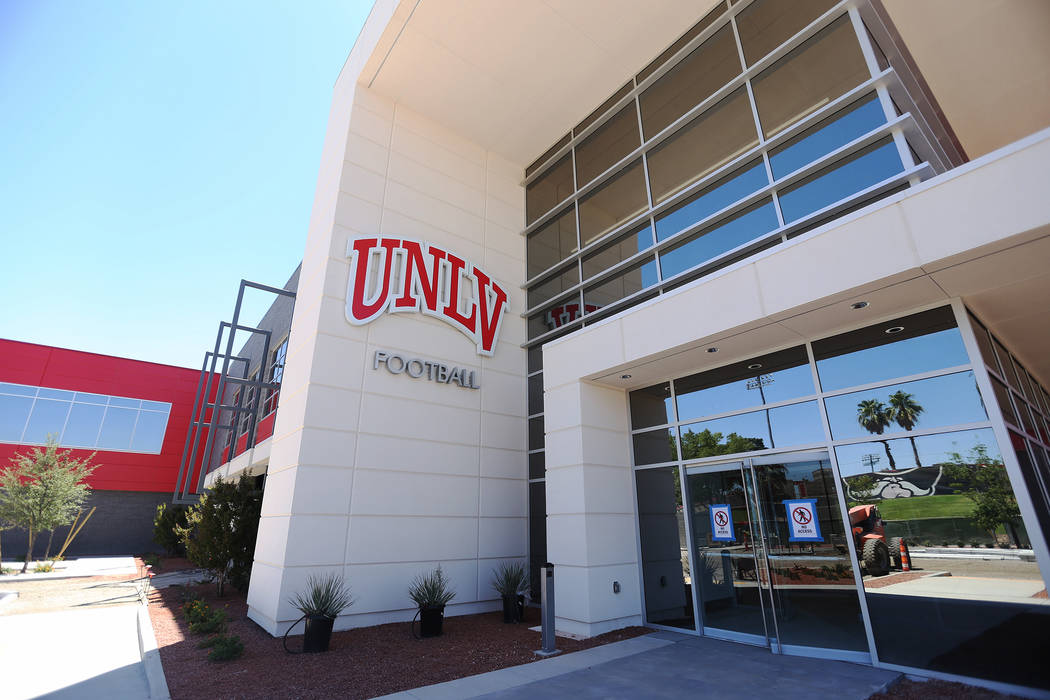UNLV can’t be satisfied in college athletics’ arm race

When the 73,000-square-foot Fertitta Football Complex opens in October, UNLV will celebrate what it hopes is a turning point in its program.
A similar feeling will set in after the Rebels begin playing games next year in the 65,000-seat Allegiant Stadium, where they are co-tenants with the Raiders.
As satisfying as those moments will be for UNLV, coaches and officials know in the arms race that is college football — even outside the Power Five conferences — there is never a time to be satisfied.
“If you’re not improving, if you’re not investing, you are falling behind,” said David Carter, a sports business expert and professor at Southern
California. “The status quo, in terms of facilities, is no longer an option when it comes to being able to recruit. Even the midmajors, even some of the second-tier conferences, they are certainly competing aggressively against one another for talent, and often it comes down to facilities.”
That includes the Mountain West. Every conference program has upgraded its facilities in some form since 2011.
The Rebels are one of four programs that have or soon will play in new stadiums. Colorado State moved into a 36,500-seat venue in 2017, San Diego State’s 35,000-seat stadium is projected to open in 2022, and the state of Hawaii has appropriated $350 million so its flagship institution can construct a replacement for Aloha Stadium.
San Jose State upgrading facilities
To underscore the urgency felt throughout the conference, San Jose State, not content to finish last in the West Division, has committed $45 million in a phased-in, privately financed project that is scheduled to be completed in 2023. About $30 million of the project has been raised.
The east side of the stadium will be removed after this season, and construction on the Spartan Athletics Center will begin next year. Though the building will be mostly for football, the men’s and women’s soccer programs will use it as well.
San Jose State athletic director Marie Tuite said improving the football facilities has been long discussed, but money first went into upgrades for other sports. She noted the importance of third-year football coach Brent Brennan having a facility that helps “build a sustainable and competitive program.”
“We’ve got to get it built,” Tuite said. “We’ve been talking about it for a number of years, and it’s such a crucial piece, and not just to our football program but to our entire athletics program because of the dining facility and other amenities that will be in the building. It’s going to help all 22 programs.”
Tuite’s effort to put a spark into a Spartans football program that has won seven games over the past three seasons underscores how athletic directors throughout the nation are trying to keep up with or get ahead in the race for better facilities.
Those facilities not only provide a more attractive college option for recruits, but they help the athletes on campus through their focus on better nutrition and training methods.
“A young person should not pick an institution because of their facilities,” Tuite said. “There are so many other really important factors. However, facilities tell a young person how the institution feels about their passion, how the institution feels about the enterprise that they love being a part of every single day, their sport. That’s why it is so crucial.”
Next steps for UNLV
After the Fertitta Football Complex opens, UNLV coach Tony Sanchez said he would like to turn his attention to an indoor-practice facility.
But he also said it’s important to do more than build facilities. It’s important to improve the current ones as well, such as the Lied Athletic Complex, which was built in 1996 and will undergo a renovation after UNLV’s football team moves into the Fertitta building.
“You look at the Lied,” Sanchez said. “The problem is we never maintained it. You walk in, what in that building is new? What’s been remodeled? What’s been renovated? I think we have a great opportunity.”
The planned renovation will allow the athletic department to create the Student-Athlete Excellence Center. The expected start date for that project, which is going through the bidding process, is Nov. 1.
“I want all of my student-athletes to have that same feeling when they walk into the Lied that our football players are going to have when they walk into the Fertitta Football Complex,” UNLV athletic director Desiree Reed-Francois said.
The center will go beyond addressing a player’s academic and athletic needs. Reed-Francois said by focusing on the entire college athlete experience, that center is as good an advertisement for recruits as shiny new buildings because players will relay their experiences there to potential prospects.
“Facilities are just one part of the overall student-athlete experience at UNLV,” Reed-Francois said. “It’s a visible part, an important part, but it’s just one component. That holistic program is something that’s critical not only so that we can provide our student-athletes that championship experience, but also to attract the next future group of Rebels.”
More Rebels: Follow at reviewjournal.com/Rebels and @RJ_Sports on Twitter.
Contact reporter Mark Anderson at manderson@reviewjournal.com. Follow @markanderson65 on Twitter.